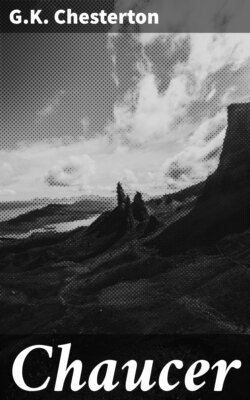Chaucer

Реклама. ООО «ЛитРес», ИНН: 7719571260.
Оглавление
g.k Chesterton. Chaucer
Chaucer
Table of Contents
Introduction
CHAPTER I. The Greatness of Chaucer
CHAPTER II. The Age of Chaucer
CHAPTER III. Public and Private Life
CHAPTER IV. The Garden of Romance
CHAPTER V. The Canterbury Tales
CHAPTER VI. Chaucer as an Englishman
CHAPTER VII. Chaucer and the Renaissance
CHAPTER VIII. The Religion of Chaucer
CHAPTER IX. The Moral of the Story
THE END
Отрывок из книги
G.K. Chesterton
Published by Good Press, 2021
.....
Now even if we consider Chaucer only as a humorist, he was in this very exact sense a great humorist. And by this I do not only mean a very good humorist. I mean a humorist in the grand style; a humorist whose broad outlook embraced the world as a whole, and saw even great humanity against a background of greater things. This quality of grandeur in a joke is one which I can only explain by an example. The example also illustrates that clinging curse of all the criticism of Chaucer; the fact that while the poet is always large and humorous, the critics are often small and serious. They not only get hold of the wrong end of the stick, but of the diminishing end of the telescope; and take in a detail when they should be taking in a design. The Chaucerian irony is sometimes so large that it is too large to be seen. I know no more striking example than the business of his own contribution to the tales of the Canterbury Pilgrims. A thousand times have I heard men tell (as Chaucer himself would put it) that the poet wrote The Rime of Sir Topas as a parody of certain bad romantic verse of his own time. And the learned would be willing to fill their notes with examples of this bad poetry, with the addition of not a little bad prose. It is all very scholarly, and it is all perfectly true; but it entirely misses the point. The joke is not that Chaucer is joking at bad ballad-mongers; the joke is much larger than that. To see the scope of this gigantic jest we must take in the whole position of the poet and the whole conception of the poem.
The Poet is the Maker; he is the creator of a cosmos; and Chaucer is the creator of the whole world of his creatures. He made the pilgrimage; he made the pilgrims. He made all the tales that are told by the pilgrims. Out of him is all the golden pageantry and chivalry of 'The Knight's Tale;' all the rank and rowdy farce of the Miller's; he told through the mouth of the Prioress the pathetic legend of the Child Martyr and through the mouth of the Squire the wild, almost Arabian romance of Cambuscan. And he told them all in sustained melodious verse, seldom so continuously prolonged in literature; in a style that sings from start to finish. Then in due course, as the poet is also a pilgrim among the other pilgrims, he is asked for his contribution. He is at first struck dumb with embarrassment; and then suddenly starts a gabble of the worst doggerel in the book. It is so bad that, after a page or two of it, the tolerant innkeeper breaks in with the desperate protest of one who can bear no more, in words that could be best translated as 'Gorlumme!' or 'This is a bit too thick!' The poet is shouted down by a righteous revolt of his hearers, and can only defend himself by saying sadly that this is the only poem he knows. Then, by way of a final climax or anticlimax of the same satire, he solemnly proceeds to tell a rather dull story in prose.
.....